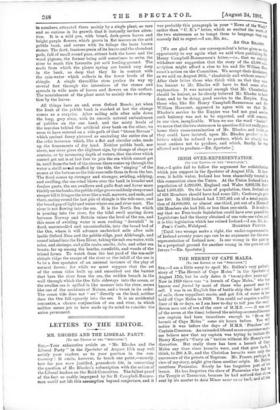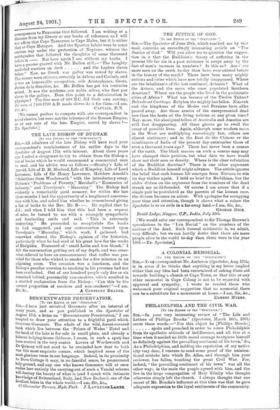THE HERMIT OF CAPE MALEA.
[To THE EDITOR OF TEE "SPECTATOR:1 SIR,—I am a little sorry to spoil Mr. Bullen's very pathetic story of "The Hermit of Cape Malea" in the Spectator of August 17th, but he only dates it " twenty-five years ago." Now in 1859 there was " a hermit of Cape Malea," who was known and feared by most of those who passed near his cell. I was in an English line of battle ship that lost-a suit of sails, three topgallant masts, and got 3 ft. of water in her hold off Cape Malea in 1859. You could not capsize a sailing liner of th use days, so I am here to-day to tell you the story. Seven men out of ten of the crew of H.M.S. — (I was one of the seven at the time) believed the mishap occurred because our captain had been incautious enough to " D—n the hermit of Cape Males. " some six hours before. You will notice it was before the days of H.M.S. Pinafore and Captain Corcoran. An extended life and more experience make me believe now that my captain was trying to imitate Sir Henry Keppel's " Carry on " tactics without Sir Henry's Wise discretion. But really there has been a hermit of Cape Male°, any time since hermits were, and that goes hank, I think, to 200 A.D., and the Christian hermits were only the successors of the priests of Neptune. Mr. Frazer, perhaps, in view of my story, might give them another origin. Mr. Bullen mentions Pausanias. Surely he has forgotten part. of his lesson. He has forgotten the slave- of Pausanias who fled to -the Temple at Taenarum, because he had noticed that slaws sent by his master to Asia Minor never came back and all the consequences to Pausanias that followed. I am writing at a distance from my library or any books of reference, so I will not affirm that Cape Taenarum is Cape Malea, but it is either that or Cape Matapan. And the Spartan helots were in some curious way under the protection of Neptune. witness the earthquakes that followed the slaughter of some thousand helots in —. But here again I am without my books. I have a greater quarrel with Mr. Bullen still,—" The haughty mail-clad warriors on deck and the hapless slaves below." Now, no Greek war galley was rowed by slaves. The rowers were citizens, certainly in Athens and Corinth, and it was an honourable occupation, vide Aristophanes, Grote, Jtrien de in GraviCre, &c. Mr. Bullen has got his centuries mixed. It was the moderns, our noble selves, who first put slaves in the galleys. Does this point to a deterioration in physique? The free men of 400 B.C. did their own rowing; the men of 1100-1700 A.D. made slaves do it for them.—I am,
[We cannot profess to compete with our correspondent in naval daisies, but were not the triremes of the Roman Empire, or at any rate of the late Empire, rowed by slaves ?- ED. Spectator.]



































 Previous page
Previous page